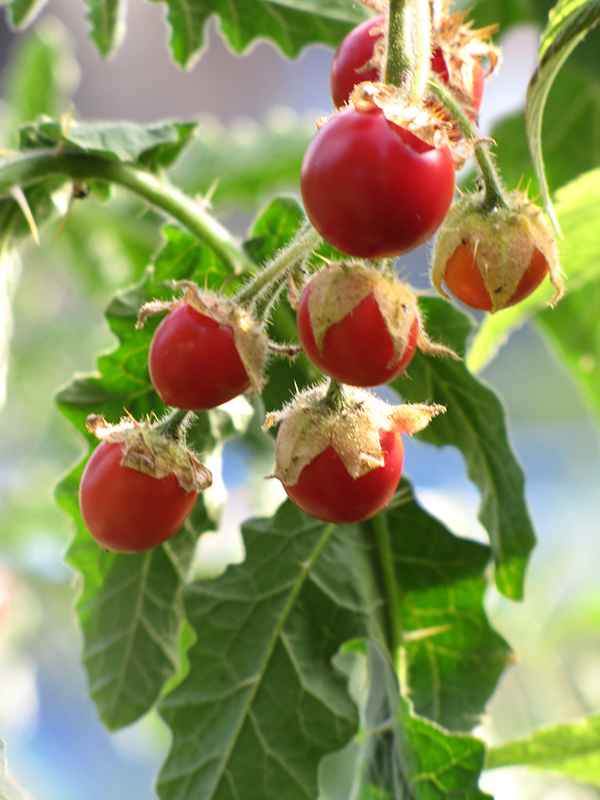Height: 5 feet
Spacing: 24 inches
Sunlight:
![]()
Hardiness Zone: (annual)
Other Names: Morelle de Balbis, Sticky Nightshade, Fire and Ice
Group/Class: Indeterminate
Description:
Easy to grow and frost tolerant, this variety is thorny and delicious; produces clusters of small, bright red fruit that are encased in a green spikey husk; tart like sour cherries crossed with a tomato, great for preserves, chutneys, pickles and sauces
Edible Qualities
Litchi Tomato is an annual vegetable plant that is commonly grown for its edible qualities. It produces small clusters of red round fruit with red flesh which are usually ready for picking from mid summer to mid fall. This is an indeterminate variety, which means it produces fruit throughout the growing season. The fruits have a tart taste.
The fruit are most often used in the following ways:
- Fresh Eating
- Eating When Cooked/Prepared
- Cooking
- Baking
- Preserves
Planting & Growing
Litchi Tomato will grow to be about 5 feet tall at maturity, with a spread of 24 inches. When planted in rows, individual plants should be spaced approximately 24 inches apart. Because of its vigorous growth habit, it may require staking or supplemental support. This fast-growing vegetable plant is an annual, which means that it will grow for one season in your garden and then die after producing a crop.
This plant can be difficult to integrate into a landscape or flower garden, and is best grown in a designated vegetable garden. It should only be grown in full sunlight. It does best in average to evenly moist conditions, but will not tolerate standing water. It may require supplemental watering during periods of drought or extended heat. It is not particular as to soil pH, but grows best in rich soils. It is somewhat tolerant of urban pollution. Consider applying a thick mulch around the root zone over the growing season to conserve soil moisture. This species is not originally from North America, and it is considered by many to be an heirloom plant.
Litchi Tomato is a good choice for the vegetable garden, but it is also well-suited for use in outdoor pots and containers. With its upright habit of growth, it is best suited for use as a 'thriller' in the 'spiller-thriller-filler' container combination; plant it near the center of the pot, surrounded by smaller plants and those that spill over the edges. It is even sizeable enough that it can be grown alone in a suitable container. Note that when growing plants in outdoor containers and baskets, they may require more frequent waterings than they would in the yard or garden.

